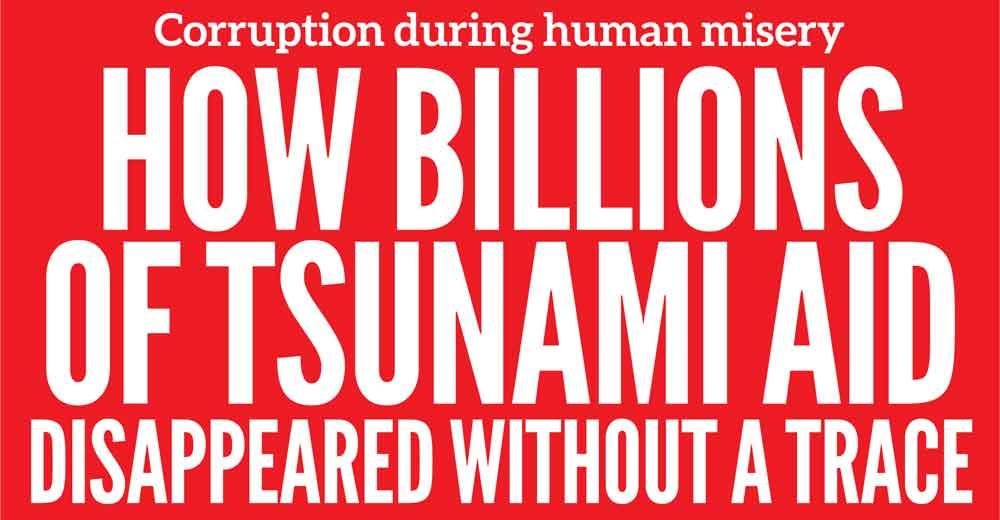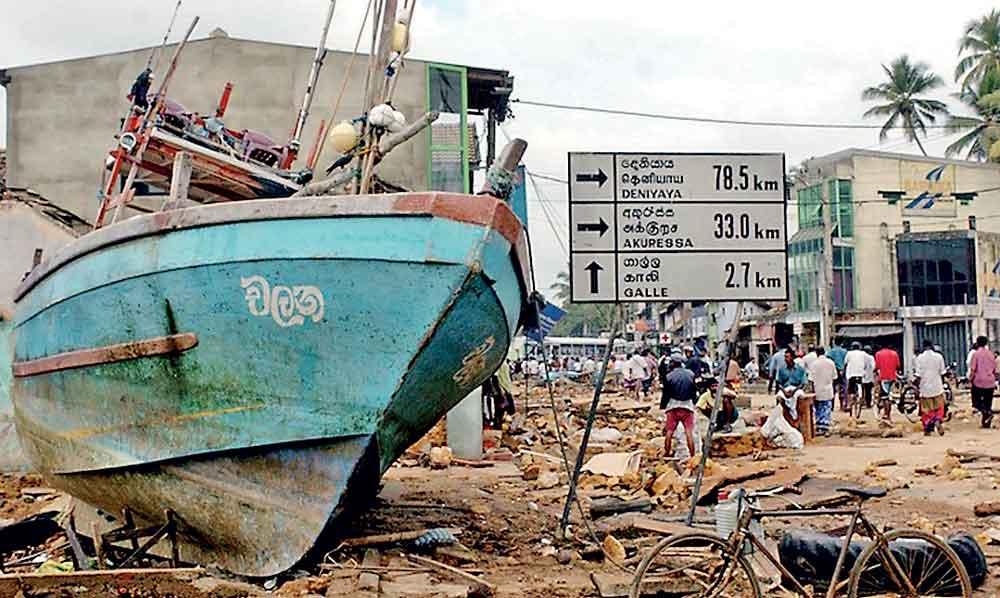Reply To:
Name - Reply Comment


According to reports billions of dollars poured into the country in the form of aid to be distributed among tsunami victims
|
Certain reports pointed out that Sri Lanka received 3.2 billion dollars in foreign aid pledges Officials had given millions of rupees which came as tsunami assistance to families who weren’t directly affected while others displaced didn’t get even entitled rations Muslim community were the worst affected by the tsunami and number of villages in the east were flattened |
 Local media highlighted the twentieth anniversary of devastating Tsunami that struck Sri Lanka on December 26, 2004 and snatched away almost one percent of the Muslim population. However it failed to underscore how billions of tsunami aid disappeared without a trace.
Local media highlighted the twentieth anniversary of devastating Tsunami that struck Sri Lanka on December 26, 2004 and snatched away almost one percent of the Muslim population. However it failed to underscore how billions of tsunami aid disappeared without a trace.
According to reports, tsunami victims didn’t get any aid and they did not know where the aid money went. Some reports stated that money was feverishly transferred not only to government establishments, but also to accounts of individuals, companies and charity organizations.
Sri Lanka’s then Deputy Executive Director of the Anti-graft Organization Rukshana Nanayakkara said: “It was almost impossible to find out what happened to the cash. According to an initial government audit, only 13 percent of the aid was spent during the first year of reconstruction, but since then there has been no formal examination of accounts.”
He added, “there has been no proper accounts maintained on the aid money and we believe that only a fraction of the aid trickled down to the real victims”.
For example Saudi Arabia built 500 houses for Muslim families affected by Tsunami. Houses were ready for occupation. Extremists, led by Buddhist monks, opposed giving the houses only to Muslims. Thus the houses were not given. Today they are covered with thick jungle where snakes, reptiles and other wild animals live.
While tsunami victims were languishing in appalling conditions in inhospitable temporary shelters, there began to emerge report after report of corruption highlighting to what extent human beings could descend to in exploiting even human misery and sufferings for their own benefit.
Funds misspent
A report by the then Auditor-General, S.C. Mayadunne states,“government officials misspent or misappropriated hundreds of thousands of dollars worth of tsunami aid after failing to follow instructions. Officials gave millions of rupees in tsunami assistance to thousands of families who were not directly affected while others displaced by the tsunami did not even get the rations they were entitled to”.
Certain reports pointed out that Sri Lanka received 3.2 billion dollars in foreign aid pledges. In the absence of proper account-keeping, many believe that only a fraction of the aid actually went to the real victims and it was impossible to track down what happened to the money.
Under the headline “Merry times for tsunami racketeers” this is what was penned in an article by Shamindra Ferdinando in ‘The ‘Island of December 26, 2006: “Even years after the tsunami, the government is yet to punish State officials accountable for waste, corruption and negligence in the aftermath of the unprecedented natural disaster.
“Inquiries reveal that the government has failed to initiate action against them despite clear evidence of wasteful expenditure on a large scale. Politicians have connived with officials to help their supporters play out funds and in some cases, further the interests of their associates. They have profited from crooked deals involving crooked means, hiring of vehicles and compensation for damaged and destroyed houses.
Summing up the situation, a compassionate Buddhist had this to say in his column in a local daily: “It is true that we did rise to the occasion, but sadly it is also true that we folded up even faster than it took us to stand tall. This is why at 9.30 a.m. on December 26, if we mourn anything, we should mourn the tragic fact that we could not respond adequately as citizens, as fellow human beings. Perhaps we should all go to the beach, if not to show gratitude, to lament. Let us, when we do this, or whatever else we find ourselves doing at that most inauspicious time, reflect on the fact that in this Buddhist country there is a thing called karma pala, that while some things are bad, among the worst is the intent to prey on misery, and that such transgressions have a way of constructing appropriate punishments.
“I suggest, humbly, that we recognize in our blood streams, in our heartbeats and our sinews the sad truth that we have failed and hope that this recognition generates in all of us the first seeds of resolve that allows us to do better. Let us resolve to rectify our errors and truly emerge as a people worthy of a nation, simply by developing the faculty of sympathy and gathering the strength to move forward, not alone but with each and every one left behind by the tsunami waves.”
The Muslim community were the worst affected by the tsunami and number of villages in the east were flattened. During the first few post-tsunami days, there was an unparalleled outpouring of support and sympathy for the victims. Spontaneous goodwill poured forth overwhelmingly when people from all communities and from all walks of life rushed to help the victims.
In Colombo, many left everything and rushed with whatever food, water and clothes they could gather to help the victims everywhere. It was highly commendable that in doing so they rose above race, religion, ethnicity and other considerations.
Individuals who emptied their pockets and the civil organizations that rushed to the scene of disaster with whatever possible aid also restored the fading faith in humanity.
They demonstrated that compassion and human kindness still remain alive among the average people though politicians play politics and divide the communities. Though the tsunami brought together the warring and divided communities, yet it was a short-lived dream as conflict broke out within a year. According to early estimates, the total value of the damage stood at US$1.5 billion. According to reports billions of dollars poured into the country in the form of aid to the unfortunate tsunami victims.
During tsunami disaster, then President Chandrika Kumaratunga, who was in London, rushed home and assured that the houses of victims would be rebuilt within six months. But these promises disappeared in the same way of the tsunami waves, despite billions of rupees given to help tsunami victims.
In the aftermath of the tsunami, President Kumaratunga’s government initiated a move to sign a joint mechanism with the LTTE. But the Muslim tsunami victims were not only kept in the dark, but were also ignored by the agreement to please the LTTE which opposed Muslim participation.
In her desire to seal an agreement at any cost, President Kumaratunga ignored the Muslims. The so-called peace broker, Norway was active partner in this conspiracy against the Muslim tsunami victims.
Columnist Sassanka Samarakkody said, “The main priority of our opportunistic political leaders is certainly not the wellbeing of the people or the territorial integrity of the country, but to cling on to power or grab power at any cost”.